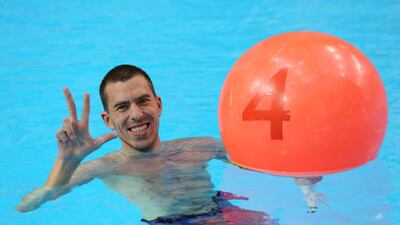The longer nothing happens, the more exciting the outcome – welcome to the world of competitive freediving, the most breathless sport in the world.
Yesterday saw the conclusion of the Fazza Championship for Freediving 2015 at Hamdan Sports Complex in Dubai, and the main attraction was Branko Petrovic of Serbia, a man who lived and breathed (or not) freediving before he even knew it was a sport.
“I started when I was very young,” he said. “As a kid I was spearfishing, selling fish. For a long time that was my job, and then I heard rumours about these competitions but I thought it was just a myth, because I was like ‘who’s going to give you something for what I spend 10 hours a day doing?’ ”
Eventually he found his way to this competition in 2013.
“Somehow I got money and came here,” Petrovic said. “I was third and the year after, with God’s help, I managed to break the record of the competition and win.”
It is no wonder Petrovic, 28, feels at home in Dubai. On October 7 last year, he set a new Guinness World Record at Skydive Dubai when he held his breath for an astonishing 11 minutes and 54 seconds.
On Thursday, the first day of competition, he spent about 15 minutes focusing on the task ahead before taking to the pool.
He said it was not ideal preparation, even though he managed 10 minutes and 28 seconds under water.
“I didn’t have a long time to prepare today,” he said. “I didn’t pack properly when I got down. It’s a freediving term, when you swallow the air. I didn’t pack as much as I could, so I was expecting better, but eventually everything went fine.”
The meditative state is not simply a metaphor in freediving.
For someone who consistently posts 10 minutes under water, what is his mental state, say, half way through a dive?
“I’m sleeping, I’m really sleeping,” he said. “Literally sleeping, literally dreaming.”
So when does his internal alarm go off?
“Maybe after eight, nine minutes, depends,” he said. “Sometimes 10. I listen to my body, and someone above who’s watching me.”
Petrovic said it was not as important to be physically fit to be a freediver as much as it is to be mentally fit.
Marina Kazankova, another competitor who also runs a workshop on freediving in Dubai, agreed.
“Sure, mentally it’s much more important,” she said. “If you train a long time but you can’t relax, you will make a short time, but you cannot train for a long time and still make a better time.” In her courses, Kazankova tries to instil in her students that the key to success is in letting go and enjoying the experience of diving.
“You shouldn’t suffer, you should get pleasure from your performance,” she said. “So you are not doing it for the time. You are like a child playing and it’s not so serious, because if you take it seriously and you want to break your time it can easily lead to blackout.”
Petrovic is certain he will be back in Dubai soon, perhaps after a spot of spearfishing back home.
“Yes, yes, this is my hobby,” the boy from Belgrade said. “When you start doing something in your life, it’s like a passion. At least I don’t have to sell any more fish. Now when I catch the fish, I eat the fish.”
akhaled@thenational.ae
Follow us on twitter at @NatSportUAE

